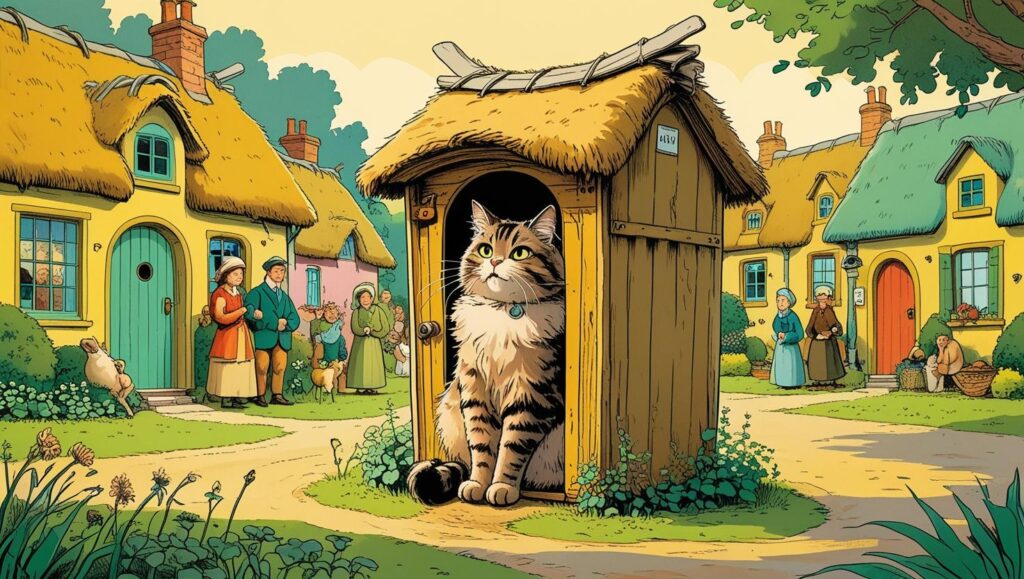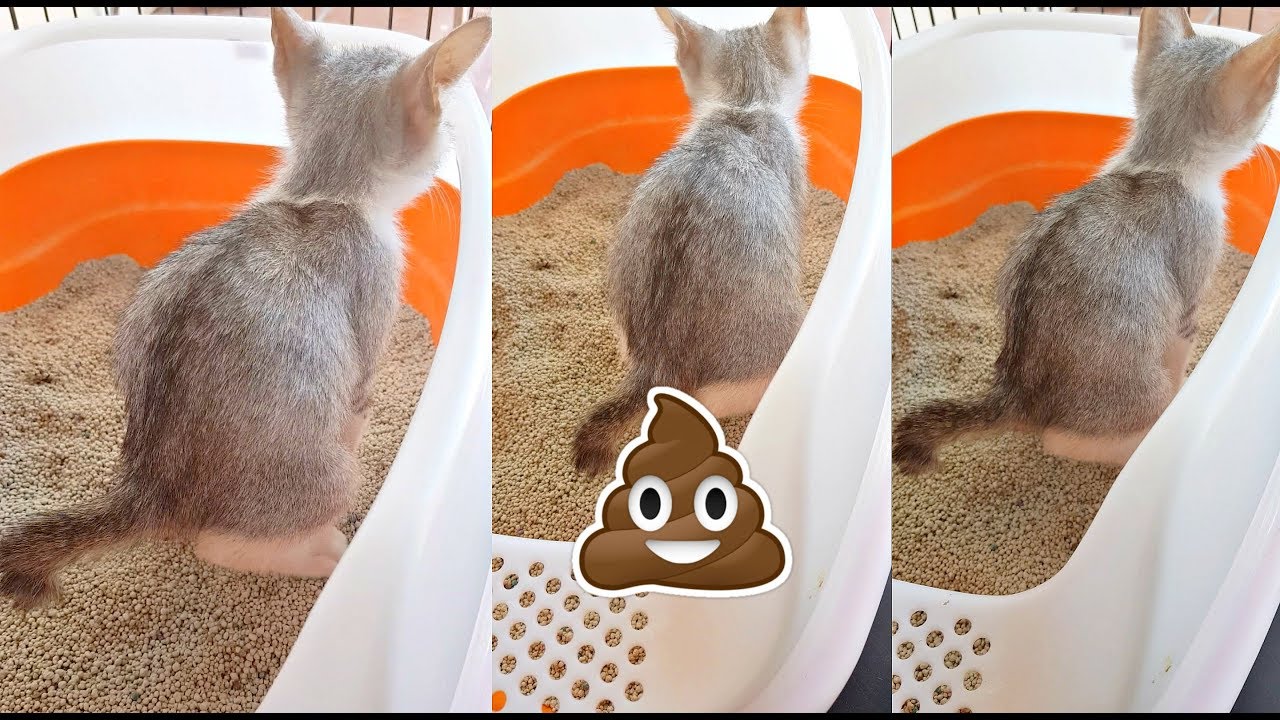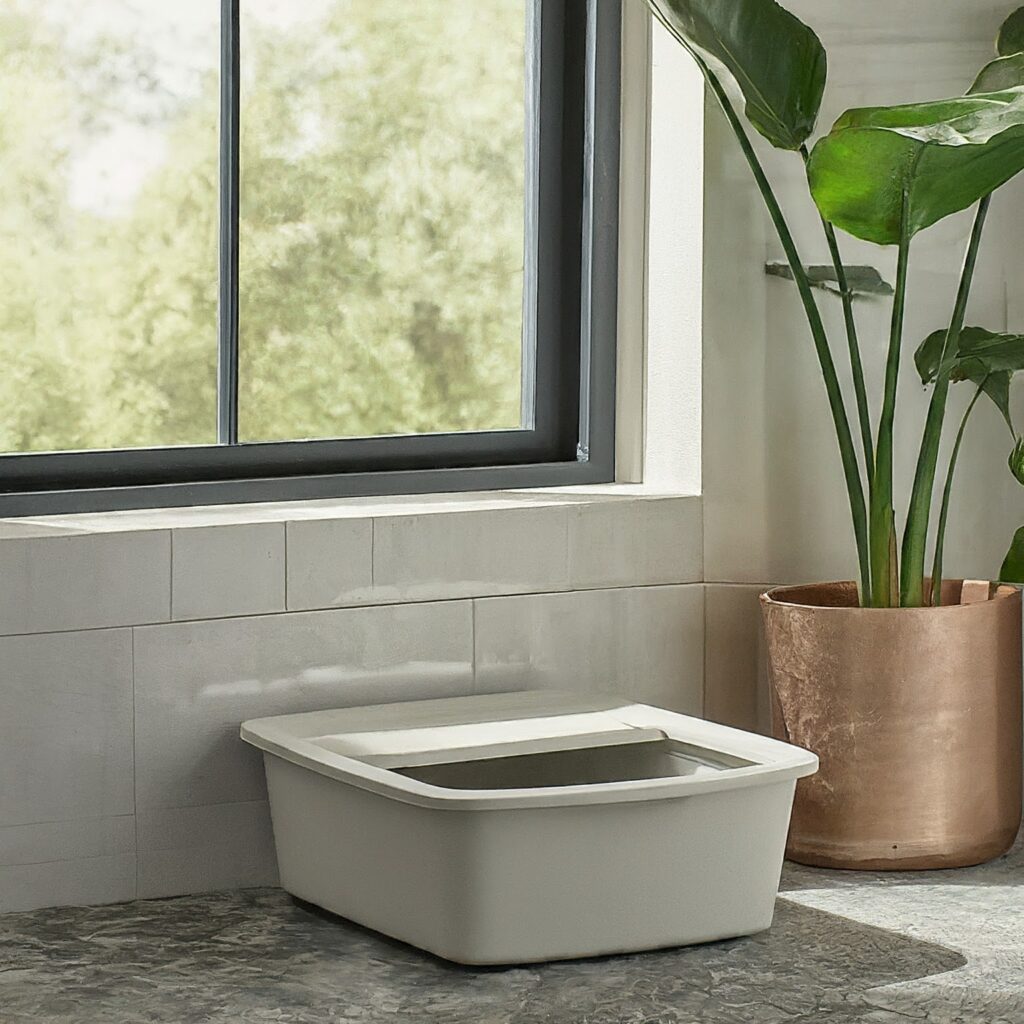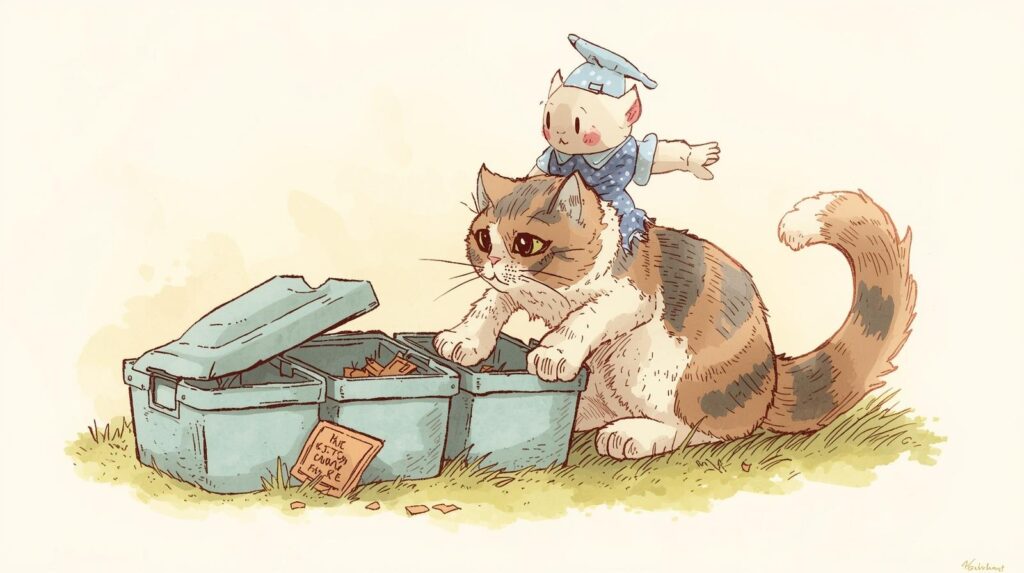
If your cat meows while pooping, it’s usually a signal of discomfort, pain, or a behavioral quirk. Cats may vocalize due to constipation, urinary issues, age-related problems, or simply as a form of communication. While sometimes it’s normal, repeated or distressed sounds often point to underlying health issues that shouldn’t be ignored. Whether it’s a male cat meows while pooping, a female cat meows while pooping, or even an old cat meows while pooping, paying attention to the context can save your pet from serious discomfort.
One important thing here is that you read this blog thoroughly and read it till the end. Here you will get a lot of information about your dear friend and your health, which I have created for you with great difficulty.
Table of Contents
How do I know if my cat is in pain when pooping?
One of the most common reasons a cat meows while pooping is because they are experiencing pain or discomfort. Cats are experts at hiding illness, so vocalizing during elimination can be one of the earliest warning signs that something is wrong. Many pet parents search for “signs of constipation in cats,” “how to tell if a cat is straining,” or “symptoms of painful pooping in cats”—and here’s what to look for:
Key Signs Your Cat May Be in Pain While Pooping
- Frequent trips to the litter box with little output – indicates constipation or blockage.
- Straining or crouching for several minutes – normal pooping should take under 1–2 minutes.
- Crying, yowling, or meowing – if your cat meows while pooping in a loud or distressed tone, it’s usually pain-related.
- Small, dry, or hard stools – classic sign of dehydration or constipation.
- Blood or mucus in stool – possible colitis, infection, or anal gland disease.
- Hunched back or tensed belly – cats in abdominal pain will often adopt this posture.
- Avoiding the litter box – painful associations can cause them to seek other spots.
- Overgrooming around the anus or tail area – cats lick excessively to soothe irritation.
Common Medical Causes of Painful Pooping
- Constipation or megacolon – hard stools make elimination painful.
- Anal gland impaction – swollen glands can cause sharp pain.
- Inflammatory Bowel Disease (IBD) – irritation leads to straining and discomfort.
- Intestinal parasites – worms can cause gut pain and abnormal stools.
- Arthritis in older cats – squatting in the box may hurt, leading to an old cat meows while pooping scenario.
- Urinary tract problems – straining to urinate can look like straining to poop, often with vocalization.
When to Call the Vet
If you notice:
- No bowel movement in over 48 hours
- Loud crying every time your cat poops
- Blood in stool
- Vomiting with constipation
…it’s time to seek veterinary help immediately. Cats can deteriorate quickly with bowel blockages or urinary issues.
Why do cats meow before poop?

Many cat owners get concerned when their cat meows before poop. Is it a warning sign, a quirky habit, or something serious? According to what people actually search for online—queries like “cat meows before using litter box,” “is my cat in pain before pooping,” “cat yowls before poop normal?”—there are both behavioral and medical explanations.
Behavioral Reasons Cats Meow Before Poop
- Communication / Alerting You – Cats are natural communicators. A male cat meowing in the litter box before pooping might simply be announcing their intentions.
- Territorial Instinct – Cats feel vulnerable when squatting. Meowing before elimination can be their way of warning others: “I’m busy, don’t disturb me.”
- Attention-Seeking – Some cats learn that if they meow before pooping, their humans will come running. This can become a habit.
- Routine Behavior – Certain breeds (Siamese, Bengal) are naturally more vocal and include pre-poop meows in their daily routine.
- Stress or Environment – If the litter box is dirty, too small, or placed in a noisy area, cats may cry before going as a way of showing discomfort.
Medical Reasons Cats Meow Before Poop
- Anticipation of Pain – If elimination has been painful in the past (constipation, diarrhea, anal gland problems), cats may start vocalizing before even attempting to poop.
- Urinary Confusion – Sometimes, cats mix up signals between peeing and pooping. If they have a UTI or bladder discomfort, they may meow before entering the box.
- Digestive Upset – A female cat meows while pooping (or even just before) if she feels bloated, crampy, or has gastrointestinal sensitivity.
- Age-Related Anxiety – Senior cats with cognitive decline often vocalize at unusual times, including just before elimination.
How to Tell If It’s Normal or a Problem
Ask yourself:
- Is the meow short and soft, or long and distressed?
- Does your cat strain or look uncomfortable after the meow?
- Is the stool normal, or are there changes (hard pellets, diarrhea, blood)?
- Has the frequency of meowing increased suddenly?
If your cat is otherwise healthy and stools are normal, a pre-poop meow is likely harmless. But if paired with pain signs, it’s time for a vet check.
Preventing Painful Pooping in Cats
Cats often struggle with painful pooping because of simple, preventable causes like poor diet, dehydration, a dirty litter box, or stress. By understanding each factor and taking small daily steps, you can prevent constipation in cats, stop cat straining, and help your feline stay comfortable.
Common Causes & How to Fix Them
1. Low-Fiber Diet
Cats eating mostly dry or low-fiber food can become constipated.
Fix: Add more fiber through wet food or a vet-approved fiber supplement. Consider mixing a spoon of pumpkin puree with their meal — it helps soften stools naturally.
2. Dehydration
Cats that drink too little water produce dry stools, making elimination painful.
Fix: Always provide clean, fresh water. Using a cat fountain (like Catit Flower Fountain) encourages frequent drinking.
3. Dirty Litter Box
A dirty or smelly litter box can make your cat hold in poop, leading to constipation and stress.
Fix: Scoop daily, replace litter weekly, and use unscented, soft litter to avoid irritation.
4. Stress and Anxiety
Changes in the environment, new pets, or loud noises can make cats hold back bowel movements.
Fix: Keep the litter box in a calm, private corner. Provide a predictable routine and soft bedding. Calming sprays or diffusers (like Feliway) can also help.
Home Remedies for Mild Cat Constipation
If your cat hasn’t pooped in a day or two but still acts normally, mild remedies can help before visiting the vet. These are natural ways to help cats poop and can safely be tried at home.
1. Pumpkin Puree
Add 1–2 teaspoons of plain, unsweetened pumpkin puree to food. It’s rich in fiber and moisture, helping to soften stool naturally.
2. Hydration Boost
Encourage more drinking through a water fountain or by mixing a little low-sodium chicken broth into water.
3. Gentle Belly Massage
Rub your cat’s belly gently in circular motions for 2–3 minutes. It can stimulate bowel movement and ease mild constipation.
4. Natural Fiber Supplements
Try vet-approved fiber powders like psyllium husk (Metamucil, in small doses). Always confirm with your vet before using.
If constipation lasts more than 48 hours, or your cat strains or cries, visit a vet immediately.
Best Diet for Cats with Pooping Issues
Diet plays a major role in healthy digestion and smooth elimination. Here’s what to focus on if your cat struggles with constipation or sensitive digestion.
Wet Food vs. Dry Food
- Wet Food: Higher water content = softer stool and less straining. Ideal for cats prone to constipation.
- Dry Food: Fine if your cat drinks enough water — choose formulas labeled for digestive health.
Fiber Sources for Healthy Pooping
- Pumpkin – great natural fiber booster.
- Psyllium Husk – increases stool moisture and volume.
- Special Vet Diets – options like Royal Canin Gastrointestinal Fiber Response or Hill’s Science Diet Perfect Digestion are excellent choices.
✅ These diets support gut balance, prevent constipation, and improve stool consistency
When to Worry About Cat Poop Color
The color of your cat’s stool tells a lot about their health. Here’s a quick guide:
- Brown: Normal, healthy poop.
- Black or Dark Tarry: Could signal internal bleeding — call your vet.
- Yellow or Pale: May indicate liver or bile issues.
- White Mucus or Worms: Could mean infection or parasites.
If you ever wonder why your cat’s poop is black or has an unusual texture, collect a sample and show it to your vet — it helps in fast diagnosis
Vet-Approved Litter Box Setup Tips
A clean, comfortable litter box can prevent stress, straining, and even urinary or bowel problems.
1. Box Size & Placement
Choose a box 1.5x the length of your cat. Keep it in a quiet, accessible area.
2. Depth & Litter Type
Use 2–3 inches of soft, unscented litter — rough or perfumed types can hurt sensitive paws.
3. Multiple Boxes
In multi-cat homes, keep one box per cat plus one extra.
4. Senior Cats
Older cats benefit from low-entry litter boxes that reduce joint strain and make squatting easier.
Following these best litter box setup tips can reduce vocalization and stress when your cat uses the box.
Behavioral Training Tip
Sometimes, meowing or crying in the litter box has less to do with health and more with learned behavior or anxiety.
Positive Reinforcement
Reward your cat with gentle praise or a treat after successful litter box use. Never punish accidents — this only increases anxiety.
Reducing Fear or Anxiety
Keep the box in a calm area away from washing machines or loud sounds. Use pheromone diffusers or calming sprays.
If your cat fears the box after painful pooping, gently reintroduce it with soft litter and a positive association.
These steps help train cats to use litter boxes confidently and reduce cat litter box anxiety.
Recommended Products for Cats with Pooping or Litter Box Issues
Here are some vet-recommended and cat-parent-approved products to make your cat’s bathroom time comfortable and stress-free:
1. Fiber & Digestive Support
- Purina Pro Plan Veterinary Diets FortiFlora – supports gut health and regular stools.
- VetriScience Hairball & Digestion Support Treats – great for constipated cats.
2. Hydration Boosters
- Catit Flower Fountain – encourages cats to drink more water.
- Purina Hydra Care Hydration Supplement – helps prevent constipation.
3. Comfortable Litter Boxes
Petmate Booda Dome Clean Step Litter Box – covered and odor-controlling.
- Iris USA Large Top Entry Litter Box – ideal for multi-cat homes.
4. Soft, Unscented Litter
- Dr. Elsey’s Precious Cat Ultra Clumping Litter – hypoallergenic and dust-free.
- World’s Best Cat Litter (Unscented Corn Formula) – natural, soft, and gentle.
5. Constipation & Anal Gland Relief
- Tomlyn Laxatone Cat Hairball Remedy Gel – mild laxative and hairball relief.
- Glandex Anal Gland Support Powder – promotes digestive and gland health.
6. Senior Cat Comfort
- PetFusion Ultimate Cat Scratcher Lounge – supports easy posture and reduces arthritis pain.
- Frisco Senior Cat Low-Entry Litter Box – perfect for older cats with joint issues.
Why does a cat cry while pooping?
Cat meows while pooping can be alarming, but if your cat actually cries or yowls, it’s usually a sign of something more serious. Pet parents often search for “cat crying when pooping diarrhea,” “cat crying in litter box,” or “cat crying from constipation.” Let’s break down the main reasons:
Common Medical Reasons for Crying While Pooping
- Constipation & Hard Stools
Cats with dry, compact stools may strain and cry as passing feces becomes painful. Dehydration and low-fiber diets are common triggers. - Diarrhea & Gut Irritation
A cat crying when pooping diarrhea often suffers from infections, food intolerances, or parasites. The gut spasms cause discomfort, leading to vocalization. - Anal Gland Problems
Impacted or infected anal glands make defecation painful. Crying during pooping is a classic warning sign. - Urinary Tract Disorders
Cats sometimes strain to urinate and poop at the same time. A urinary tract infection (UTI) or bladder stone can make them cry inside the box. - Inflammatory Bowel Disease (IBD)
Chronic gut inflammation makes pooping uncomfortable, resulting in repeated cries. - Arthritis in Older Cats
An old cat meows while pooping because squatting in the box puts pressure on sore joints.
Environmental or Behavioral Causes
- Dirty or Uncomfortable Setup
If the cat litter is dirty, scented, or too rough, cats may associate the box with discomfort and cry while using it. - Stress or Anxiety
Multi-cat households, loud noises, or sudden changes in the environment can make cats vocalize during elimination. - Breed-Related Behavior
Talkative breeds (Siamese, Oriental) sometimes cry even when not in pain—just part of their natural communication.
How to Tell if It’s Serious
Your cat’s cry is likely medical if:
- It’s loud, distressed, or high-pitched
- The cat strains or crouches for long periods
- Stool is abnormal (too hard, too watery, or bloody)
- They avoid the box altogether
It may be behavioral/environmental if:
- Stool is normal
- The cat otherwise looks healthy
- Crying only happens when the box is dirty or stressful
When to Seek Vet Care
- Crying with no stool output → possible blockage
- Blood or mucus in stool
- Repeated diarrhea with cries
- Vomiting alongside painful pooping
Remember, sometimes excessive crying is not just about bathroom habits but part of a bigger vocalization pattern. As one guide on Why Is My Cat Meowing So Much? explains, frequent meowing can point to underlying discomfort, stress, or even illness.
Do Cats Meow When the Litter Box Is Full?
Yes — many cats will meow when the litter box is full, and it’s usually their way of sending a clear message: “Clean my bathroom!” Cats are naturally clean animals, and their sense of smell is much stronger than ours. What seems like a slightly dirty box to us can feel unbearable to them.
Why Cats Meow at a Full Litter Box
- Strong Smell Triggers Discomfort
Cats’ noses are sensitive, and the ammonia smell from urine or soiled litter can quickly overwhelm them. Meowing may be their way of protesting. - Instinct for Cleanliness
In the wild, cats cover waste to hide their scent from predators. A dirty litter box prevents them from doing this, so meowing is their way of showing frustration. - Avoidance Behavior
Some cats will meow, then refuse to use the box entirely if it’s too dirty. They may even start eliminating outside the box, signaling that they’re unhappy. - Stress & Anxiety
A soiled box can make cats anxious. They may vocalize before or after entering because the environment feels unsafe or unpleasant. In fact, vocal protests often fall under broader feline behaviors studied in The Cat’s Meow! Caterwauling in Cats, where meowing is a tool of communication, not always a sign of pain.
How to Tell if It’s the Litter Box or Something Else
Cats might also meow in or around the litter box for medical reasons. To know if it’s just cleanliness or a health problem:
- If meowing stops once the box is cleaned → it’s likely just hygiene-related.
- If meowing continues even with a clean box → check for constipation, diarrhea, or urinary tract issues.
- If your male cat meowing in the litter box happens regularly despite a clean setup, a vet visit is important.
How to Prevent “Dirty Box Meowing”
- Scoop solid waste daily (at least once, preferably twice).
- Replace litter weekly to avoid odor buildup.
- Keep at least one litter box per cat + one extra in multi-cat homes.
- Choose unscented, soft litter if your cat seems sensitive.
- Clean the entire box with mild soap every 2–3 weeks.
Why Is My Cat Making Sounds When Pooping?
Strange noises while your cat is in the litter box can be confusing. Some cats grunt, growl, or even meow during bowel movements. While an occasional sound may not be alarming, consistent vocalization often signals discomfort, stress, or pain.
Common Reasons Cats Make Sounds While Pooping
- Constipation & Straining
Hard, dry stools force your cat to push harder, which can lead to groaning, meowing, or grunting. This is especially common in dehydrated cats or those on low-fibre diets. - Diarrhoea or Gut Cramping
Loose stools and intestinal spasms can cause discomfort, making your cat cry or meow during the process. Pet parents often search for phrases like “cat meows while pooping diarrhoea” when this happens. - Anal Gland Problems
Blocked or infected anal glands can make pooping painful. Cats often vocalize as they squat due to the pressure in this area. - Urinary Tract or Bladder Issues
Sometimes cats strain to urinate and defecate at the same time. A urinary tract infection (UTI) or bladder stone can make them sound distressed while in the litter box. - Arthritis or Mobility Issues
Older cats may vocalize not from the act of pooping, but from the difficulty of squatting. An old cat meows while pooping because the posture stresses painful joints. - Behavioral Communication
Not all sounds are about pain. Some breeds (like Siamese or Orientals) are naturally more vocal. These cats may simply “talk” while eliminating — part of their normal expression.
How to Tell if the Sounds Are Serious
Your cat may need vet attention if:
- The sound is distressed, loud, or unusual compared to normal meows
- Your cat strains for a long time without producing stool
- Stool is bloody, very hard, or watery
- They avoid or fear the litter box
- You notice weight loss, vomiting, or changes in appetite
If the sounds are soft or happen only occasionally — and the stool looks normal — it may be harmless communication.
How to Help a Cat That Makes Sounds While Pooping
- Provide fresh water daily to prevent constipation.
- Feed a high-fiber diet or add vet-approved fiber supplements.
- Keep the cat litter box clean and easy to access.
- For senior cats, use a low-sided litter box to reduce joint strain.
- Schedule regular vet checkups, especially if vocalization is new or worsening.
In many cases, when your cat meows while pooping, it’s their way of saying something doesn’t feel right. Always trust your instincts — if the sounds are unusual, it’s worth getting professional advice.
FAQs
Why does my cat cry before pooping?
A cat may cry before pooping if they anticipate pain — often from constipation, anal gland issues, or diarrhea. It can also be behavioral: some cats vocalize before elimination to get attention or signal stress.
Old cat meows while pooping – why does age matter?
An old cat meows while pooping mostly due to arthritis or mobility issues. Squatting in the box strains their joints, causing pain and meowing. Age-related constipation or kidney problems can also add to the discomfort.
Cat crying when pooping diarrhea – what does it mean?
If your cat cries when pooping diarrhea, it often means gut irritation, food allergies, or parasites. The watery stool causes cramping, making your cat vocalize. Dehydration is also a risk, so consult a vet if diarrhea lasts more than 24 hours.
Female cat meows while pooping – is it different from males?
When a female cat meows while pooping, the causes are usually similar: constipation, diarrhea, or discomfort in the litter box. However, females may also vocalize due to reproductive issues like uterine infections. If your female cat shows pain alongside unusual discharge, seek vet care.
Male cat meows while pooping – should I worry?
Yes, if a male cat meows while pooping, it could signal constipation, urinary issues, or even a blockage (which is more common in males). If he strains with little or no output, see a vet immediately as it can be life-threatening.
Further reading
Why is the cat not using the litter box
Wrapping up
Cat meowing while pooping can feel worrying, but it’s also one of the most important signals your pet gives you about their health. While some cats are simply more vocal and use sounds as part of their normal communication, repeated crying, straining, or yowling during bathroom time often points to something more serious.
Whether it’s a male cat meows while pooping because of a urinary blockage, or an old cat meows while pooping due to arthritis pain, your cat is trying to tell you that something isn’t right. Even if it turns out to be a dirty litter box or a behavioral trigger, it’s always better to rule out medical problems first.
- Occasional soft meows may be harmless.
- Loud, distressed cries, straining, or changes in stool consistency should never be ignored.
- Timely veterinary care can prevent small issues like constipation or diarrhea from turning into life-threatening conditions.
- A clean litter box and the right cat litter can also make a huge difference in your cat’s comfort.
As a pet parent, the best thing you can do is observe, respond, and seek professional advice when needed. If your cat meows while pooping frequently, keep track of the pattern, note any other symptoms, and consult your vet. With quick attention, most of these problems can be resolved — keeping your feline friend comfortable, healthy, and happy.



